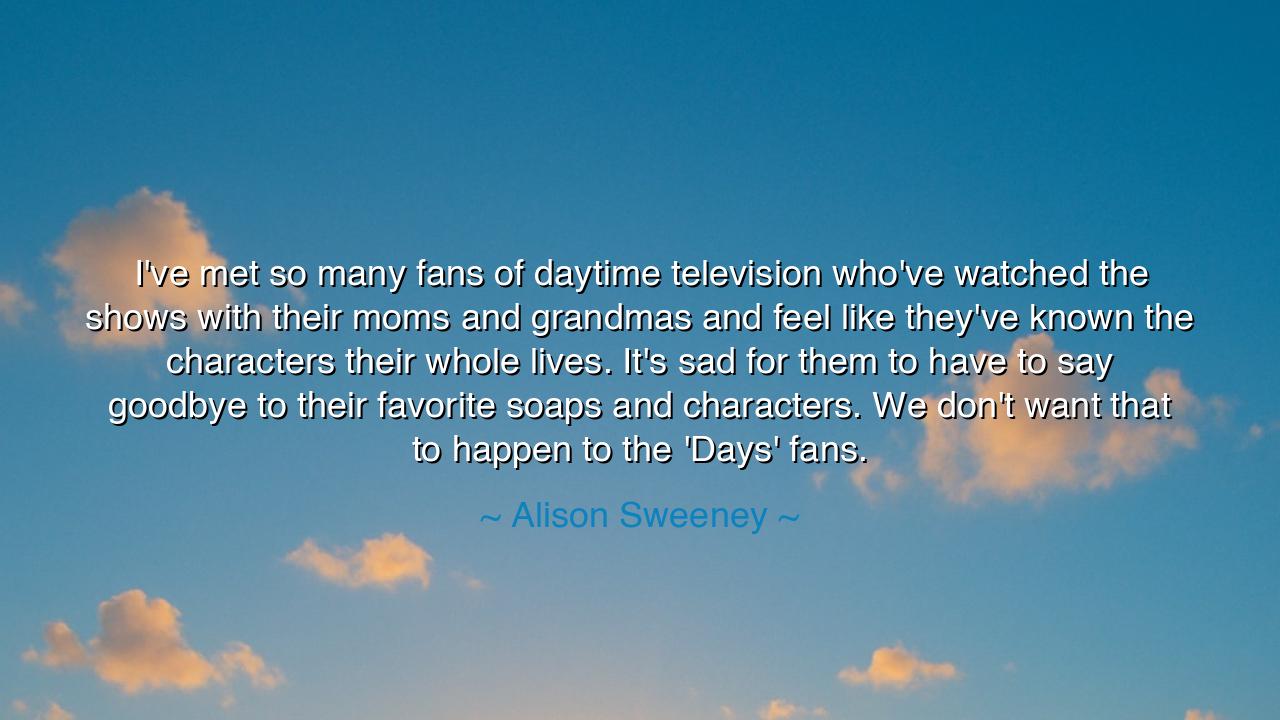
I've met so many fans of daytime television who've watched the
I've met so many fans of daytime television who've watched the shows with their moms and grandmas and feel like they've known the characters their whole lives. It's sad for them to have to say goodbye to their favorite soaps and characters. We don't want that to happen to the 'Days' fans.






Hear, O keepers of memory and story, the words of Alison Sweeney, an actress whose voice carries the spirit of devotion to art and to those who cherish it: “I've met so many fans of daytime television who've watched the shows with their moms and grandmas and feel like they've known the characters their whole lives. It's sad for them to have to say goodbye to their favorite soaps and characters. We don't want that to happen to the 'Days' fans.” Within these tender words lies not only a reflection on television, but a meditation on the power of shared stories, the threads that bind generations together through imagination, emotion, and time.
The origin of this quote arises from Sweeney’s long journey with Days of Our Lives, one of the most enduring and beloved soap operas in American history. Having portrayed Sami Brady for decades, she became both a storyteller and a witness to the devotion of fans who grew up alongside the series. The soap opera, though dismissed by some as mere entertainment, became in truth a living tapestry of continuity—a space where families gathered, where mothers, daughters, and grandmothers shared laughter, heartbreak, and hope through the lives of fictional characters. For these viewers, the stories were not fleeting illusions but companions across the seasons of their own lives.
Sweeney’s reflection speaks to a universal longing for connection. She recognizes that art—whether written, sung, or filmed—serves as a mirror of the soul, and when that art endures for decades, it becomes more than creation: it becomes heritage. In every home where a grandmother once poured tea and turned on the television, in every kitchen where a mother and daughter discussed the day’s dramatic turns, a sacred ritual was being born. This ritual of shared storytelling, humble yet profound, wove families closer together. Thus, when a show ends, it feels not merely like the loss of entertainment, but like the fading of an old friend.
History has known such grief before. When the ancient Greek theaters closed their doors, the people mourned not just the plays, but the spirit of communal storytelling that united them. In ancient Rome, when poets and bards fell silent during wars, citizens lamented as though a light had gone out of the city. Even in our modern world, when long-standing traditions fade—be they soap operas, folk songs, or printed newspapers—humanity loses a piece of its shared rhythm. For what Sweeney describes is not nostalgia; it is the pain of cultural silence, the sorrow of losing a chorus that once gave voice to human feeling.
Her words also contain a deeper truth about continuity and legacy. The shows she speaks of are not merely episodes—they are lifelines that teach endurance. The soap opera, in its endless unfolding, mirrors life itself: stories of love, betrayal, loss, and renewal. In their constancy, people find comfort. They remind us that time moves forward, that wounds heal, that new generations rise even as old ones fade. Sweeney’s desire to protect “the Days fans” is an act of guardianship—a vow to preserve a living symbol of hope and familiarity in a world where permanence grows rare.
There is a moral lesson here, too, for all who live in an age of speed and impermanence: do not undervalue the quiet rituals that sustain connection. Whether it is a shared meal, a family story, or a beloved show watched across decades, these small acts form the architecture of belonging. They are the invisible foundations upon which communities endure. To lose them carelessly is to forget who we are.
Thus, let the words of Alison Sweeney be remembered as more than an actress’s reflection—they are a hymn to continuity, to the sacred act of sharing stories across time. When she speaks of mothers and grandmothers passing tales from one heart to another, she speaks to the eternal duty of humanity: to remember together. Let us, then, preserve our stories—not only in art, but in life—so that future generations may feel, as we did, that they too have known the characters of their own age “their whole lives.” For as long as we remember, as long as we tell and listen, the story—like love itself—shall never truly end.






AAdministratorAdministrator
Welcome, honored guests. Please leave a comment, we will respond soon